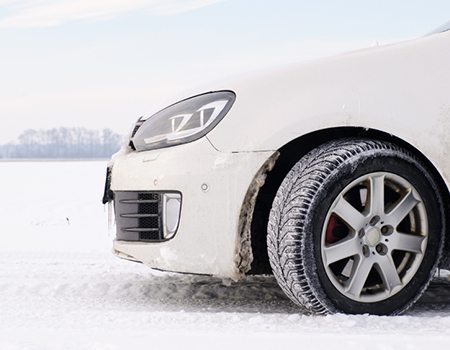In cold weather, many systems of your car work at the top of their bent, and, therefore need a special care. The winter turns a poorly maintained car into a dangerous and uncontrolled heap of metal. But every driver has a chance to avoid sad winter accidents if they invest their time and money in a careful preparation of their vehicle for the winter. We will tell you what the car’s most vulnerable places in winter are and what drivers should pay their attention at (from winter tyres to battery and lubricants) in order to stay safe on wintry roads.
Winter tyres – number-one safety measure in winter
You change your shoes from light sneakers to boots with more aggressive tread when winter arrives. Similarly, your car needs new shoes too. The point is in traction provided by the tread (tyre’s sole). If you anticipate driving a lot in ice and snow this winter, buy a set of winter tyres beforehand. They give you a substantial advantage on wet and slippery pavements thanks to their deeper tread and more pliant rubber compound that doesn’t stiffen at low temperatures. Always buy a full set of winter/snow tyres (4 pieces) because otherwise non-winter tyres might skid and you can lose control of your vehicle in the most critical moment.
Another safety concern about tyres is keeping them properly inflated. Low temperatures cause the drop of pressure inside them, which, in turn, makes a tyre more prone to punctures. Regularly check the pressure with a gauge and adjust it to the car manufacturer’s requirements.
Other car parts that need special winter care
- Vehicle battery. Its ability to start your car in the cold winter morning can be seriously compromised by a low temperature. Especially if you have an old battery (they usually serve no more than 3-5 years). When the battery is about to die, the water inside of it (every battery contains distilled water and battery acid) can get frozen easier. Ensure that your car battery has the correct level of distilled water and that its cables have no ruptures. If you’ve got a new battery, you can protect it by driving every day or at least starting the car and warming it up for 10 minutes or so to recharge the battery.
- Motor oil and other fluids. Your car contains a solid amount of liquids which, of course, are prone to changing their aggregate state in cold conditions. Using high-performance automotive oil suitable for winter will protect you from an unexpected engine breakdown and a costly repair. For the winter season, motor oil must be thinner, so choose oil products with a lower oil viscosity (thickness) rate. Experts recommend 5W oils for winter.
Keep your car’s cooling system clean and ensure that the radiator is filled with water and antifreeze in the proper proportion. Do the antifreeze change every 3 years or so.
3. Wipers. Good visibility is crucial in winter, so you should carefully inspect your windshield and everything that is intended to keep it clean. Ensure that wipers are soft and have enough wiper fluid to prevent the windshield from freezing. If you noticed that your wipers had become rigid or cracked, it’s time to replace them. If you have new wipers, you can prolong their life by pulling them off when the car is parked. This will protect them from sticking to the windshield and cracking.




